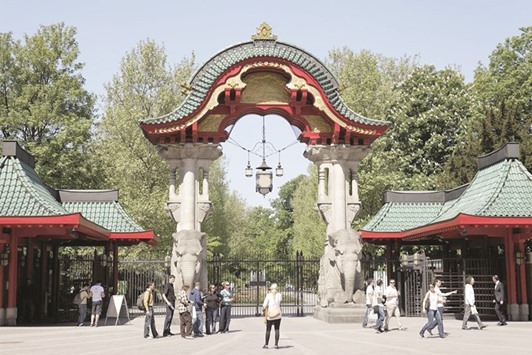
CENTRE OF ATTRACTION: The Berlin Zoological Gardens.
When Ruben Gralki wakes up and looks out his window, he sees antelopes and giraffes. One storey below him, chimpanzees and gorillas bounce around their cages.
It’s not an animal control problem in his building. The zoo minder has a home in the middle of Berlin’s Zoological Garden. He has lived there for the past five years.
“I only need a minute to get to work from my flat, right above the monkey house,” he says.
Gralki, who works with primates, is one of 32 employees at the zoo who has a flat with all mod cons right in the zoo. There could be no better care for the animals than live-in keepers.
Some 17 workers and their families have accommodation in the city’s other zoo — the Tierpark, which lies in the city’s east — says Andreas Knieriem. His office is in the Tierpark and he is responsible for both facilities.
It’s not just animal tenders who live in the zoos. Others who have taken up residence there include technicians and locksmiths, who are sometimes needed for emergencies.
“We try to spread it out and distribute the on-the-job accommodation based on the importance of the employee,” says Knieriem.
Friends and relations of the select few who live on zoo property are often jealous of such an exotic address. After all, it’s not just anyone who can claim to live with the birds and the pachyderms, much less in a building as unique as a former veterinary clinic.
The distinction is even rarer once you factor in that these residents are in the middle of the metropolis that is Berlin and on the historic site of one of Germany’s oldest zoos.
“For a lot of zoo visitors, living in the zoo seems like it would be heaven on earth,” says Knieriem, who lives at the edge of the Zoological Garden, above the aquarium. But there are drawbacks. And even for those who enjoy the experience, it can quickly grow routine.
“We have to make sure that the nice parts stay nice. We experience the problems close-up,” says Knieriem. He says he notices every little problem at the zoo.
“If the cranes call out loudly, I have to ask myself if they’re just staking out territory or if there’s a fox lurking nearby,” he notes.
Then there are the more mundane nuisances, like youths who loiter on the zoo property after closing time or young mothers who don’t dispose of their baby’s nappy properly.
Gralki says he generally just sees the positives. Being there means that when the unexpected happens — like last year, when an orangutan would not bond with its newborn — he gets called in.
In this case, he was the one who got to take over the hand-feeding. Just like a human baby, the infant orangutan needed to be carried around non-stop. It demanded a bottle and needed a diaper.
The German’s long-term girlfriend, who now lives with him at the zoo, treated the baby orangutan, named Rieke, like her own.
“That experience was a real highlight,” says Gralki, 37.
Another benefit is rent that’s cheaper than what he would pay “outside.” The apartments are of a normal German standard with their own bathrooms, kitchens and central heating. In exchange, the zoo expects him to take on more responsibility.
That’s no problem for Gralki. “I enjoy being an animal worker and like to be close to the apes.”
Of course, it does make everyday life a touch more challenging. Every time he goes to the store, it means carrying his shopping bags home through a crowd of children. If he needs to fetch a larger item — like a piece of furniture — home with his car, he can only do so outside of zoo opening hours.
He has to meet any friends coming to see him at the front gate, otherwise they have to pay admission fees. The only exception would be if the gate attendant already knows the guest.
The Association of German Zoological Gardens says such cohabitation between animals and minders is not unusual and carries many benefits. It helps the workers identify more closely with their workplace and means they’re always on hand.
Christine Gohl, chief veterinarian at Munich’s Tierpark Hellabrun zoo, can attest to that after six years of residency at the zoo. She’s one of 30 workers who’s lived on site.
“Professionally, it’s a huge advantage to be able to be there quickly,” she says. But she says the proximity also makes it hard to tune out when she’s off the clock. Even a walk around the zoo for fun turns into a veterinary exercise.
“They’re not just any animals. They’re ‘my’ animals,” says the doctor, who has known many of them since birth.
Gralki says the only way to really get away from work is to take a trip. He says it helps that his hobby is motorcycling.
Knieriem also says he has a ritual to help him ease out of work mode.
“I always take a long way home from work. It’s only four or five minutes of walking, but it helps me close a door in my head.” — DPA
